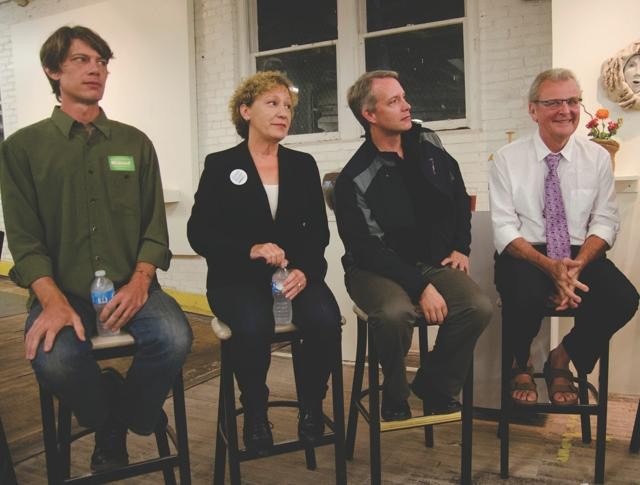This year's Asheville City Council races are off to a late start. With just five candidates competing for the three available seats, there was no primary for the first time in decades. Meanwhile, there’s been no shortage of mayoral debates (see “Doubleheader” elsewhere in this issue); those candidates do face an Oct. 8 primary.
Roughly 50 people gathered at the River Arts District's Odyssey Gallery for a Sept. 25 forum organized by local nonprofit Asheville on Bikes. They got to hear from four Council candidates who answered questions from a Jeopardy-style game grid that focused on multimodal transportation issues. Humorous questions (how does one look sexy on a bike?) were thrown in with more serious queries concerning priorities, infrastructure, the environment and how city residents can safely get from place to place. (The fifth candidate, former Asheville police officer Mike Lanning, did not attend.)
Here’s how the two newcomers and two incumbents presented themselves to their constituents for the first time in this election season.
Council member Cecil Bothwell
Bothwell began by telling the audience that everything they know about transit is about to turn upside down, because “Driverless cars are going to change everything. … It's going to happen in the next 10 years.” He revisited that theme several times in his remarks, asserting that the coming shift was why he’d opposed building more downtown parking.
Bothwell also said the current city government has made some major strides on transit.
“We're the most progressive Council I've seen in 25 years, first as a reporter, then as a member of City Council,” he declared. “We've increased the frequency of the major routes in our bus system without raising costs to the city. We've increased the bike lanes: That's huge. We've really improved mulitmodal transportation.”
Bothwell also said Ashevilleans should hold a referendum on raising more revenue to fund transit improvements. He also touted his own volunteer efforts clearing sidewalks to make them more accessible.
Gwen Wisler
“You're my peeps,” Wisler proclaimed as she introduced herself to the crowd. Talking to voters before the forum, she'd held her bike helmet in hand. “I was chairman of Strive Not to Drive, I'm a bicycle safety instructor, I'm on the Bike/Ped Task Force, I'm interested in bicycle and pedestrian advocacy, I volunteer at bike corrals, I work with Asheville on Bikes.”
Now a consultant, Wisler is the former CEO of Coleman, which manufactures outdoor gear; she emphasized her experience rather than endorsing specific policy measures. “In the spring, when all the fiscal conversations started coming up, I really felt like my business background would add to City Council,” she revealed.
Wisler also said she favors being guided by the city's existing master plans in dealing with future opportunities and issues.
Jonathan Wainscott
“Many people here might know me as the guy who hates New Belgium,” said Wainscott, drawing some chuckles from the audience. The local activist has raised concerns about the brewery the company is building in the River Arts District. “That's not actually the case,” he continued.
But Wainscott did have some sharp words for the way the city manages its business, especially in the areas of transit and other infrastructure.
“My concerns for our community are deep, and I feel our future has more to do with the actual traffic that's actually coming, rather than cars driving themselves home,” he said.
The city, asserted Wainscott, often neglects things like road maintenance and transit in favor of economic incentives for companies or projects like the Asheville Art Museum renovation. He advocated prioritizing basic services instead, expressing frustration at having to clear roads he felt the city should maintain: “I already pay taxes for that.”
Council member Gordon Smith
Smith, meanwhile, touted his work supporting multimodal transit, saying it was a plank in his 2009 campaign platform, and “I feel like we've delivered.” He cited the Bicycle and Pedestrian Task Force, the city’s dedicated Transit Department, the overhaul of bus routes and other changes.
“Going forward, we need to have Sunday service,” said Smith. “In addition, we need to maintain the rest of the funding, so we can create a working, comprehensive, interlinked, multimodal transportation network for all the people of Asheville.”
The incumbent linked transit policies to his broader campaign goals of affordable housing, access to healthier food, and better-paying jobs. He defended Council's allocating revenue from the recent tax increase for projects such as the Eagle Market Place affordable housing development and the art museum, while reiterating that transit remains a high priority.
“That will fuel the private investment that will be the revenue of the future,” predicted Smith, adding, “We have to invest in the city.”
Election looming
Even though this was the candidates' public debut, decision time is fast approaching. Early voting begins Thursday, Oct. 17, and Election Day is Tuesday, Nov. 5.
— David Forbes can be reached at 251-1333, ext. 137, or at dforbes@mountainx.com.



Before you comment
The comments section is here to provide a platform for civil dialogue on the issues we face together as a local community. Xpress is committed to offering this platform for all voices, but when the tone of the discussion gets nasty or strays off topic, we believe many people choose not to participate. Xpress editors are determined to moderate comments to ensure a constructive interchange is maintained. All comments judged not to be in keeping with the spirit of civil discourse will be removed and repeat violators will be banned. See here for our terms of service. Thank you for being part of this effort to promote respectful discussion.